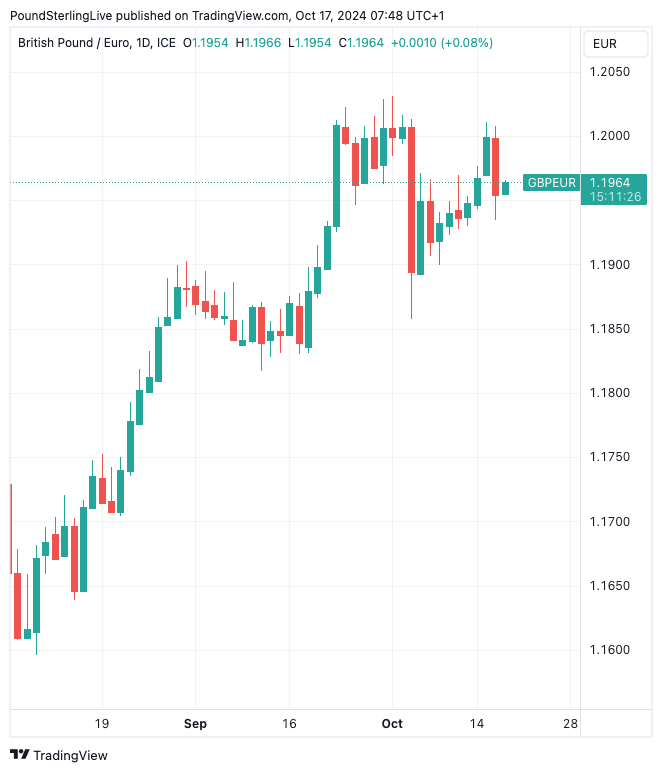Pound to Euro Rate Finds Support Ahead of ECB Rate Cut
- Written by: Gary Howes
- ECB decision is today's highlight
- GBP/EUR selloff eases in mid-1.19s
- UK rate cut bets rise following inflation data

Image © Adobe Images
Pound Sterling has recovered from recent lows against the Euro ahead of the European Central Bank's (ECB) interest rate decision and the fading impact of a surprisingly soft UK inflation report.
The Pound to Euro exchange rate (GBPEUR) slumped on Wednesday after UK inflation roundly undershot expectations and saw the placing of bets for an additional interest rate cut from the Bank of England before year-end.
UK headline inflation data fell to 1.7% year-on-year, which was significantly below the consensus expectation of 1.9% and the all-important rate of services inflation slumped to 4.9% from 5.6% in August.
Compare Currency Exchange Rates
Find out how much you could save on your international transfer
Estimated saving compared to high street banks:
£2,500.00
Free • No obligation • Takes 2 minutes
Investors had previously put a 50% chance of two quarter-point rate cuts to Bank Rate by the end of the year, according to levels implied in swaps markets.
That moved to about 75% after the inflation release. GBP/EUR responded with a fall to a low of 1.1932 before finding a bid and recovering at 1.1966.
The lack of follow-through selling suggests these inflation data are no gamechanger, possibly because inflation reports from other G10 currencies show a similar collapse in inflation as that seen in the UK.
This week, we received confirmation France's CPI inflation rate fell to 1.4% in September, Canada's to 1.6%, and New Zealand's headline inflation rate fell to 2.2%. All represented undershoots relative to expectations.
What's clear is inflation is coming down globally. Any given exchange rate is a relative concept, meaning if both sides of the equation are impacted by a similar force, the change in value should be unremarkable.
What's more, most economists think the UK's inflation rate will pick up into year-end, which should illicit ongoing caution from the Bank of England and encourage a quarterly pace of rate cuts in the coming months.
"We expect the dip below 2.0% to be short-lived, with the headline rate of inflation likely to rise back above 2.0% in October due to the 9.0% rise in the Oftem energy price cap," says Nikesh Sawjani, Senior UK Economist at Lloyds Bank.
This can ensure the UK continues to maintain one of the highest benchmark exchange rates in the G10.
🎯 GBP/EUR year-ahead forecast: Consensus targets from our survey of over 30 investment bank projections. 📩 Request your copy.
ECB Rate Cut in Focus
The Bank of England should cut rates again in November, but today sees the ECB cut for a second consecutive time, following clear evidence of a slowing Eurozone economy and slumping inflation rates.
The cut is well priced, leaving it to ECB President Christine Lagarde and her colleagues to shift the dial on expectations and, thus, euro exchange rates.
Already, markets expect a relatively steady path of rate cuts going forward, with the next move anticipated in December.
To what extent does Lagarde push back against these expectations? If she does, expect the Euro to appreciate.
But she has little ammunition at her disposal to do so, with Germany's economy in stagnation (at best) and France and Spain's inflation rates crashing well below the ECB's 2.0% mandated target.
The only straw any 'hawkish' assessment could hinge on would be that wages have not quite fallen to where they need to be to ensure confidence that inflation won't be stubborn going forward.
This will ensure the ECB maintains a data-dependent approach to interest rate decision-making, which, given the moribund state of the economy, opens the door to further rate cuts.
Will the Euro rise or fall following the ECB decision?
The ECB is unlikely to materially alter expectations for further rate cuts and this means the Euro could ultimately prove relatively resilient.
Economists at ING Bank note the EUR OIS curve (which guagues investors' expectations for the future of the ECB policy rate) is close to pricing in back-to-back ECB cuts at each of the next four meetings.
"We doubt this week’s ECB guidance (or lack thereof) will trigger much further dovish rerating," says ING.
This can keep EUR supported, meaning GBP/EUR can remain capped by 1.20 on the top and 1.1930 on the bottom.





